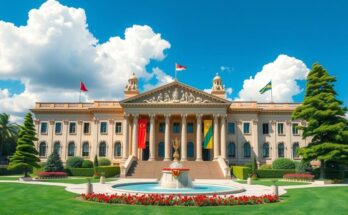Voters in Comoros are electing members for a 33-seat parliament amid controversies regarding President Azali Assoumani’s administration. Approximately 338,000 citizens are registered to vote, and almost 100 candidates are competing. Assoumani’s critics suspect he intends to position his son as his successor. Some opposition groups have called for a boycott while others participate in the elections, with results expected by Friday.
Voters in the Comoros have cast their ballots to elect representatives for the 33-seat parliament. This election follows the re-election of President Azali Assoumani, which the opposition claimed was tainted by significant irregularities. Ruling party officials, however, have dismissed these allegations as unfounded.
Polling stations were opened early on Sunday, with approximately 338,000 registered voters participating. The last parliamentary elections took place in January 2020, and nearly 100 candidates were approved by the Supreme Court to run in this election.
Critics of Assoumani have accused him of repressive governance and suspect that he aims to position his eldest son, Nour El-Fath, as his successor when his current term concludes in 2029. Assoumani has been in power since 1999, having seized control via a coup and subsequently winning three elections.
In 2024, Assoumani endowed his son with extensive authority to oversee governmental operations. Some opposition factions, including Juwa, led by former President Ahmed Abdallah Sambi, who was sentenced to life imprisonment in 2022, have called for a boycott of the elections. Conversely, others have opted to participate.
Hamidou Karihila, a candidate representing the opposition Hope of the Comoros, articulated, “The Azali regime is weakened … by participating in these elections we are contributing to further exposing the flaws in its system and accelerating its inevitable fall.”
Election results are anticipated by Friday.
The upcoming parliamentary elections in Comoros come after a controversial re-election of President Azali Assoumani, during which numerous allegations of electoral misconduct surfaced. With Assoumani’s long tenure beginning in 1999 through a coup, the political landscape has been characterized by accusations of authoritarianism. Despite calls for election boycotts, some factions of the opposition are proceeding to participate in the electoral process to challenge the current governance.
The elections in Comoros represent a critical juncture amid ongoing political tensions. With accusations against President Assoumani’s administration and the involvement of new candidates, the election outcomes may either affirm the current regime or indicate a shift towards a more representative governance. The dynamics between opposing parties and the ruling regime will play a significant role in shaping the future political landscape of the Comoros.
Original Source: www.theadvocate.com.au




